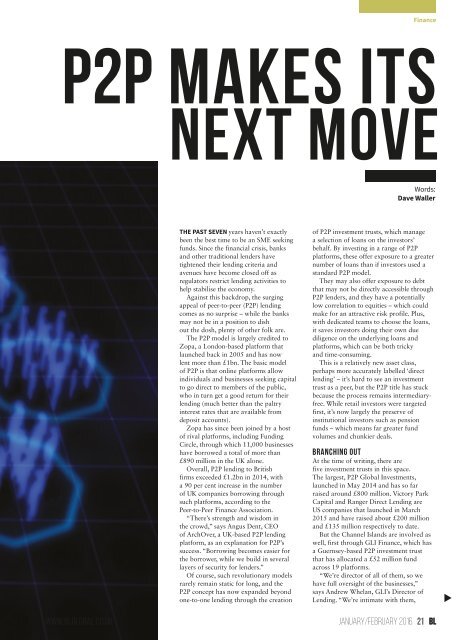BL Magazine
Create successful ePaper yourself
Turn your PDF publications into a flip-book with our unique Google optimized e-Paper software.
Finance<br />
P2P makes its<br />
next move<br />
Words:<br />
Dave Waller<br />
THE PAST SEVEN years haven’t exactly<br />
been the best time to be an SME seeking<br />
funds. Since the financial crisis, banks<br />
and other traditional lenders have<br />
tightened their lending criteria and<br />
avenues have become closed off as<br />
regulators restrict lending activities to<br />
help stabilise the economy.<br />
Against this backdrop, the surging<br />
appeal of peer-to-peer (P2P) lending<br />
comes as no surprise – while the banks<br />
may not be in a position to dish<br />
out the dosh, plenty of other folk are.<br />
The P2P model is largely credited to<br />
Zopa, a London-based platform that<br />
launched back in 2005 and has now<br />
lent more than £1bn. The basic model<br />
of P2P is that online platforms allow<br />
individuals and businesses seeking capital<br />
to go direct to members of the public,<br />
who in turn get a good return for their<br />
lending (much better than the paltry<br />
interest rates that are available from<br />
deposit accounts).<br />
Zopa has since been joined by a host<br />
of rival platforms, including Funding<br />
Circle, through which 11,000 businesses<br />
have borrowed a total of more than<br />
£890 million in the UK alone.<br />
Overall, P2P lending to British<br />
firms exceeded £1.2bn in 2014, with<br />
a 90 per cent increase in the number<br />
of UK companies borrowing through<br />
such platforms, according to the<br />
Peer-to-Peer Finance Association.<br />
“There’s strength and wisdom in<br />
the crowd,” says Angus Dent, CEO<br />
of ArchOver, a UK-based P2P lending<br />
platform, as an explanation for P2P’s<br />
success. “Borrowing becomes easier for<br />
the borrower, while we build in several<br />
layers of security for lenders.”<br />
Of course, such revolutionary models<br />
rarely remain static for long, and the<br />
P2P concept has now expanded beyond<br />
one-to-one lending through the creation<br />
of P2P investment trusts, which manage<br />
a selection of loans on the investors’<br />
behalf. By investing in a range of P2P<br />
platforms, these offer exposure to a greater<br />
number of loans than if investors used a<br />
standard P2P model.<br />
They may also offer exposure to debt<br />
that may not be directly accessible through<br />
P2P lenders, and they have a potentially<br />
low correlation to equities – which could<br />
make for an attractive risk profile. Plus,<br />
with dedicated teams to choose the loans,<br />
it saves investors doing their own due<br />
diligence on the underlying loans and<br />
platforms, which can be both tricky<br />
and time-consuming.<br />
This is a relatively new asset class,<br />
perhaps more accurately labelled ‘direct<br />
lending’ – it’s hard to see an investment<br />
trust as a peer, but the P2P title has stuck<br />
because the process remains intermediaryfree.<br />
While retail investors were targeted<br />
first, it’s now largely the preserve of<br />
institutional investors such as pension<br />
funds – which means far greater fund<br />
volumes and chunkier deals.<br />
BRANCHING OUT<br />
At the time of writing, there are<br />
five investment trusts in this space.<br />
The largest, P2P Global Investments,<br />
launched in May 2014 and has so far<br />
raised around £800 million. Victory Park<br />
Capital and Ranger Direct Lending are<br />
US companies that launched in March<br />
2015 and have raised about £200 million<br />
and £135 million respectively to date.<br />
But the Channel Islands are involved as<br />
well, first through GLI Finance, which has<br />
a Guernsey-based P2P investment trust<br />
that has allocated a £52 million fund<br />
across 19 platforms.<br />
“We’re director of all of them, so we<br />
have full oversight of the businesses,”<br />
says Andrew Whelan, GLI’s Director of<br />
Lending. “We’re intimate with them,<br />
▼<br />
www.blglobal.co.uk january/february 2016 21

















